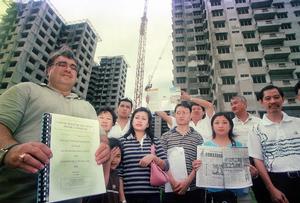Support still
strong for 'build and sell' concept
19/07/2004 NST
-
 Kuala Lumpur, Sun, - Many who have invested in homes only to find
later their housing projects abandoned fervently support the
proposed 'build and sell' concept. Kuala Lumpur, Sun, - Many who have invested in homes only to find
later their housing projects abandoned fervently support the
proposed 'build and sell' concept.
Ranjit Singh, a victim of an abandoned housing
project, said all home buyers should support the concept because it
would prevent developers absconding with their money before
completing their project.
In 1999, he and his wife Catherine applied for a
flat through Kuala Lumpur City Hall. They were recommended a project
in Taman Setapak Jaya on a piece of land owned by City Hall and
developed by a private company.
They signed a sale and purchase agreement in
February 1999 which stated that the flat would be ready in three
years.
"We believed nothing could go wrong because it was
City Hall land. But after three years, when the project was 80 per
cent complete, it was abandoned.
"Five years later, I do not see light at the end
of the tunnel despite assurances from the Housing and Local
Government Ministry and the House Buyers Association (HBA) that they
are doing their best."
At a recent meeting of the buyers with
representatives from the developer, City Hall, the ministry and HBA,
he said they were told the developer had arranged to complete the
project by 2006 but Ranjit said he had lost all confidence of ever
being able to move into his flat.
According to the ministry's website, more than
80,000 buyers have fallen prey to over 540 abandoned projects in the
country worth RM9.5 billion.
Consumers and the industry have had mixed
reactions to the "build and sell" concept proposed by Prime Minister
Datuk Seri Abdullah Ahmad Badawi in May.
Housing and Local Government Minister Datuk Seri
Ong Ka Ting said on July 3 that his ministry was preparing a report
on the concept for the Cabinet, outlining the advantages and
disadvantages and including feedback from various parties.
Construction Industry Development Board (CIDB)
general manager Abdul Latif Hitam said the "build and sell" method
could weed out unscrupulous developers and improve quality, as
purchasers can check the workmanship before paying.
"We could promote "build and sell" through the use
of the Industrialised Building System (IBS)," Latif added.
The IBS, a pre-fabrication system in which parts
of the building are mass-produced in a factory and then assembled on
site, could save time, cut costs and reduce the number of workers on
site, he said.
Asked to comment on the "build and sell" proposal,
Real Estate and Housing Developers Association president Datuk
Jeffrey Ng Tiong Lip said Malaysia's economy and state of
development was not mature enough for the concept.
He said the developers would be unable to meet the
need for 100,000 to 150,000 new units per year if the concept was
adopted as construction needs the financial resources of both
developers and buyers.
HBA committee member Datuk Goh Seng Toh said house
buyers should not risk losing their money when a project fails.
"Very few developers use their own funds, even if
they are cash-rich. They prefer to spread their risk through
bridging loans. And if they have no resources, they shouldn't be be
in the business anyway because there is a higher chance they'll have
financial difficulties," he said.
The Housing and Local Government Ministry has
asked for HBA's views on 'build and sell". The body will submit a
paper in early July.
Under the present system, a buyer pays 10 per cent
of the sales price after signing the sale and purchase agreement and
then makes progress payments based on the stage of completion.
As developers are not ready to fully implement
"build and sell", Goh suggested an "intermediate" system until they
are ready.
"Once the developer has the licence, the
housebuyer can pay about 10 per cent and this can be held by the
lawyers, who will put it in a fixed deposit with interest," he
proposed.
After that, the buyer does not pay anything else
until the house is completed.
Meanwhile, the developer will seek bridging loans
from banks.
"When the house is ready and the certificate of
fitness is issued, the buyer can be given three months to pay the
remaining 90 per cent," Goh said.
HBA also recommends that banks give bridging loans
to developers rather than end-financing to buyers.
"The banks will have full control of disbursements
and will be ultra-cautious because it is their own money," said Goh.
- Bernama |